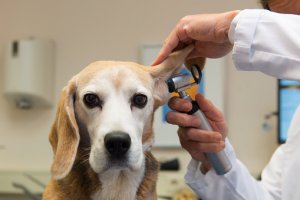Left untreated, an ear infection in a dog can lead to a variety of serious problems, including, but not limited to, facial paralysis, ocular impairments, and incoordination/loss of balance. As a pet owner, you certainly don’t want your dog to wind up with any of these conditions—and the veterinarians and staff at Animal Medical Center of Streetsboro are here to help you make sure that doesn’t happen.
Unfortunately, our furry friends aren’t able to communicate with us verbally. It’s not like your dog can come up to you and say, “Excuse me, but my ear hurts. Can you please call Dr. Leffler?”
 Fortunately, however, there are ways your dog can, and will, communicate with you to let you know that it has an ear infection. So, keep your eyes peeled for the following signs on its body and in its behavior.
Fortunately, however, there are ways your dog can, and will, communicate with you to let you know that it has an ear infection. So, keep your eyes peeled for the following signs on its body and in its behavior.
Physical Signs that Your Dog May Have an Ear Infection
- Redness and/or swelling of any part of the ear
- Discharge from the ear; or signs of dried discharge, such as scabs or crust, on the outer part of the inner ear
- Foul or abnormal odor in or around the ear
- Hair loss around the ear
- Scratch marks or scabs on or around the ear
- Any other irregularities in, on, or around any part of the ear
- Dark or cloudy urine
Behavioral Signs that Your Dog May Have an Ear Infection
- Irresponsiveness or hearing loss
- Frequent scratching of the ear, or other similar behavior such as pawing it or rubbing it against furniture or other objects
- Sensitivity when its head, face, or neck is petted or touched
- Head shaking, sudden head jolts, or repeated tilting of the head to one side
- Walking around in circles
- Whimpering or whining
- Any other noticeable changes in behavior or disposition, such as loss of appetite, energy, or spirit
What to Do if You Think Your Dog Has an Ear Infection
If you suspect that your dog has an ear infection, call Animal Medical Center of Streetsboro to set up an appointment to have your dog seen by one of our veterinarians as soon as possible. The sooner we can diagnose and treat your dog’s condition, the better, and the less likely it is to experience serious long-term, sometimes permanent, complications.

